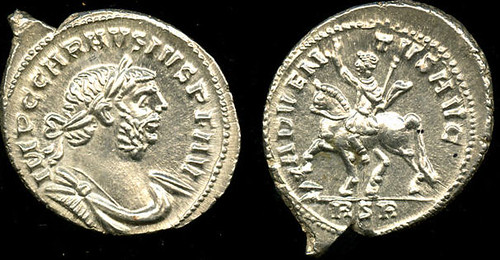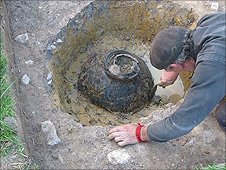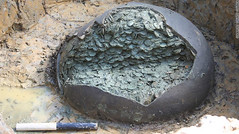
PREV ARTICLE
NEXT ARTICLE
FULL ISSUE
PREV FULL ISSUE
HUGE 3RD CENTURY ROMAN COIN FIND
Dave Sundman and Dick Hanscom forwarded this article from the BBC News.
-Editor
The hoard of more than 52,000 coins dating from the 3rd Century AD was found buried in a field near Frome in Somerset. The coins were found in a huge jar just over a foot (30cm) below the surface by Dave Crisp, from Devizes in Wiltshire. Since the discovery in late April, experts from the Portable Antiquities Scheme at the British Museum have been working through the find. The coins were all contained in a single clay pot. Although it only measured 18in (45cm) across, the coins were packed inside and would have weighed an estimated 160kg (350lb). "I don't believe myself that this is a hoard of coins intended for recovery," says Sam Moorhead from the Portable Antiquities Scheme. "I think what you could see is a community of people who are actually making offerings and they are each pouring in their own contribution to a communal ritual votive offering to the gods." It is estimated the coins were worth about four years' pay for a legionary soldier. "Because Mr Crisp resisted the temptation to dig up the coins, it has allowed archaeologists from Somerset County Council to carefully excavate the pot and its contents," said Anna Booth, local finds liaison officer. To read the complete article, see: Huge Roman coins find for hobbyist (news.bbc.co.uk/2/hi/uk/10546960.stm) Stu Williams writes: What a wonderful opportunity to study a complete hoard of this magnitude. This could be very useful for mint and dielink studies. Reading the article I think they meant 'radiates' and wonder what part of the 3rd century they date from - that makes a huge difference. Stuart. Thankfully there are good treasure trove laws in Britain. If that happened here in Ireland the hoard would have been secretly dispersed and the potential knowledge to be gained would have been lost. There is no incentive in Ireland to report archaeological finds only the threat of severe punishment by draconian laws, if found out.
Arthur Shippee found this related Associated Press article in the New York Times via Reuters. Dick Johnson found it in the Washington Post. Thanks!
-Editor
Some of the coins are stamped with the image of Marcus Aurelius Carausius a military commander who seized power in the late third century and proclaimed himself emperor of Britain and northern Gaul. Carausius who ruled from AD 286 to AD 293 was the first emperor to strike coins in Britain. "This find presents us with an opportunity to put Carausius on the map," said Bland. "School children across the country have been studying Roman Britain for decades, but are never taught about Carausius -- our lost British emperor." To read the complete article, see: Big Roman Coin Hoard Found In Britain (www.nytimes.com/reuters/2010/07/08/test/life-us-britain-coins.html)
Max Spiegel found an article about the hoard on CNN.com. It was the first I'd seen to place a value on the find, and it has some GREAT pictures. Follow the article link to see more.
-Editor
Dave Crisp, a hospital chef, came across the buried treasure while searching for "metal objects" in a field near Frome, Somerset in southwestern England.

To read the complete article, see:
Amateur unearths 52,000 Roman coins worth $1m
(www.cnn.com/2010/WORLD/europe/07/09/uk.roman.coin.treasure/)
The Numismatic Bibliomania Society is a non-profit organization promoting numismatic literature. See our web site at coinbooks.org. To submit items for publication in The E-Sylum, write to the Editor at this address: whomren@gmail.com To subscribe go to: https://my.binhost.com/lists/listinfo/esylum All Rights Reserved. NBS Home Page Contact the NBS webmaster 
|

